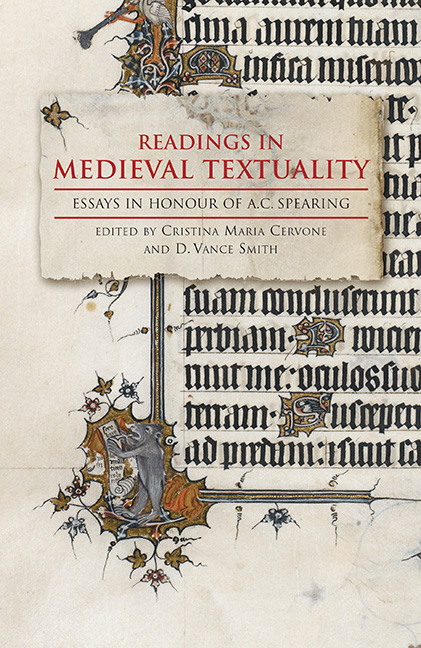Book contents
- Frontmatter
- Contents
- List of Illustrations
- List of Contributors
- A. C. Spearing's Work and Influence
- Bibliography of A. C. Spearing's Works
- I Reading Experience and Experientiality
- II Revisions and Re-visioning of Alliterative Poetry
- III Subjectivity and the Self
- IV Reading for Form
- V Epilogue
- 13 Two Appreciations of A. C. Spearing
- 14 Announcing a Literary Find Apparently Related to the Gawain-poet
- Works Cited
- Index
- Tabula Gratulatoria
13 - Two Appreciations of A. C. Spearing
from V - Epilogue
Published online by Cambridge University Press: 25 October 2017
- Frontmatter
- Contents
- List of Illustrations
- List of Contributors
- A. C. Spearing's Work and Influence
- Bibliography of A. C. Spearing's Works
- I Reading Experience and Experientiality
- II Revisions and Re-visioning of Alliterative Poetry
- III Subjectivity and the Self
- IV Reading for Form
- V Epilogue
- 13 Two Appreciations of A. C. Spearing
- 14 Announcing a Literary Find Apparently Related to the Gawain-poet
- Works Cited
- Index
- Tabula Gratulatoria
Summary
“I think I should buy a hat,” said Tony over the menu at one of his favorite Charlottesville lunch spots.
“Why is that?” I asked. I had never seen Tony wearing a hat.
He explained that he had been invited to read a paper at a conference on narrative theory in Germany, and that this event marked the beginning of his second career as an International Narrative Theorist (he pronounced it as if it were marked with a trademark symbol).
“An International Narrative Theorist,” he declared, “should have a hat.” We spent the next fifteen minutes or so discussing what kind of hat would be most appropriate for such a theorist as he had now become. Fedora? Cowboy hat? Bowler? He leaned towards a Russian fur hat, in allusion, I suppose, to such figures as Jakobson and Bakhtin.
We conducted this conversation with mock high seriousness, I playing the straight man, feeding him lines, feeling slightly off balance, and having fun.
I knew Tony Spearing, in a sense, long before I landed at the University of Virginia in January 1992. Probably few medieval literary scholars of my age do not have on their shelves one or more of his early books: Criticism and Medieval Poetry (1964), The Gawain-Poet: A Critical Study (1970), and Medieval Dream- Poetry (1976). I myself invested a portion of a thinly stretched undergraduate budget in The Gawain-Poet and considered it money well spent, for it modeled a kind of criticism that I longed to write: exacting, deeply sympathetic to both the medieval text and the modern critical tradition, written with elegance and clarity, privileging elucidation of its subject over all the other social and professional functions that academic writing performs.
And reading Tony Spearing continues to be a pleasure. I always count it a good day when I find in my mailbox a brown envelope with “Mr. Baker” lettered on the front in a hand that would do Adam Pinkhurst proud, and inside an article that demolishes my assumptions about what a “narrator” is, revolutionizes my thinking about how medieval authors composed their works, or makes me think anew about what literary criticism is all about, anyway. Tony's writing has remained lucid and elegant, but as its field of vision has become wider, it has become more challenging, and for me anyway, much more influential.
- Type
- Chapter
- Information
- Readings in Medieval TextualityEssays in Honour of A.C. Spearing, pp. 215 - 218Publisher: Boydell & BrewerPrint publication year: 2016



